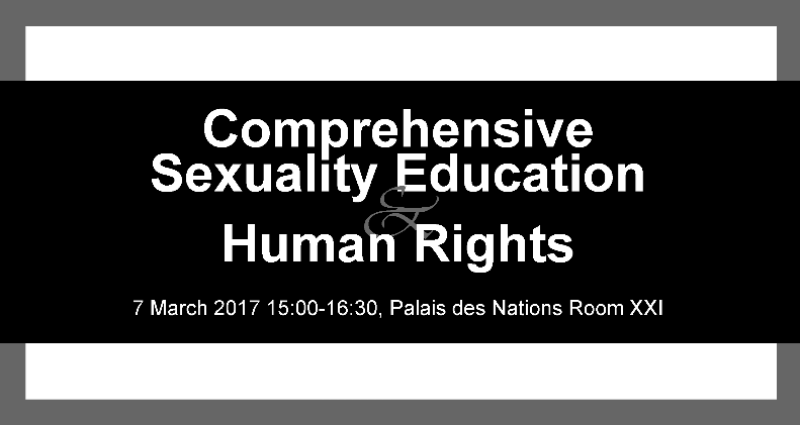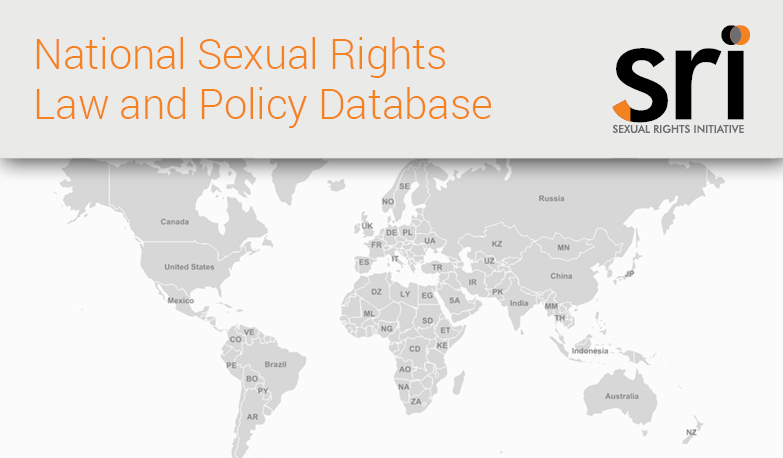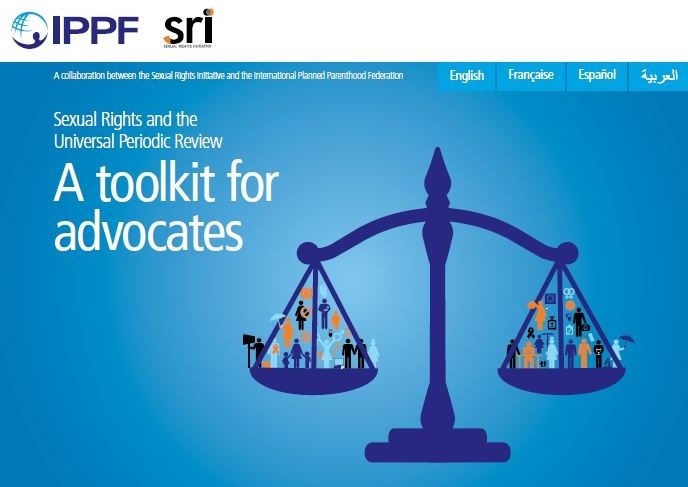HRC34: Sexual Rights Recap
The 34th session of the UN Human Rights Council took place from the 27th of February to the 24th of March 2017. Here is an overview of resolutions, panel, oral statements and side events related to sexual rights that took place during the session.
The HRC34 Recap provides information on some of the key sexual rights related:
- Resolutions
- Panels and Discussions
- Oral Statements
- Side Events
all of which the Sexual Rights Initiative (SRI) was engaged with during the session.
Sexual Rights-related Resolutions
Rights of the child: protection of the rights of the child in the implementation of the 2030 Agenda for Sustainable Development A/HRC/34/L.25
The Human Rights Council adopted by consensus a resolution on the protection of the rights of the child in the implementation of the 2030 Agenda for Sustainable Development.
The resolution, led by the EU and GRULAC, aimed to provide a child’s rights lens to the achievement of the Sustainable Development Goals (SDGs). The Resolution recognizes the importance of international human rights law to the 2030 Agenda for Sustainable Development and that children are disproportionately affected in complex humanitarian emergencies. In addition, it encourages States to strengthen their capacities to monitor progress and build on existing review mechanisms. It further acknowledges that the 2030 Agenda pledge to leave no one behind involves addressing multiple forms of inequality and discrimination, and provides an opportunity to tackle inequities faced by children especially those who are marginalized or in vulnerable situations.
However, the adopted text does not represent the most advanced human rights standards pertaining to the protection of the rights of the child and falls below the agreement reached in the 2030 Agenda. The resolution fails to incorporate the right to be heard, the right to participate, adolescents’ rights to sexual and reproductive health, and the principle of evolving capacities. The resolution also neglects the particular needs of children with disabilities and LGBTI children and does not recognize that family environments are often sites of violence, especially for girls.
Click here to read the SRI Joint Statement with CRR & CRC
______________________________________
Mandate of the Special Rapporteur on the situation of human rights defenders A/HRC/34/L.5
The resolution was adopted without a vote and led by Norway. It calls on States to respect and support the activities of human rights defenders, including women human rights defenders, and that all domestic laws should reflect this view. It strongly urges all States to take concrete steps to create, in law and in practice, a safe and enabling environment in which human rights defenders can operate free from hindrance and insecurity. One Russian amendment sought to remove reference to “women human rights defenders,” it was rejected by vote. The resolution renews the mandate of the Special Rapporteur on Human Rights Defenders for three years.
The SRI prepared an oral statement addressing the human rights defenders who work on protecting, promoting and advancing human rights related to gender and sexuality. Crimes committed against human rights defenders working on gender and sexuality are widespread but often overlooked and accepted and have the complicity and legitimization of political leaders and governments. The statement calls on States to prevent and reduce the risks that gender and sexuality human rights defenders face.
Click here to read SRI statement
______________________________________
The right to privacy in the digital age A/HRC/34/L.7/Rev.1
The resolution was adopted without a vote and led by Austria, Brazil, Germany, Liechtenstein, Mexico and Switzerland. It reaffirms the human right to privacy protected under existing domestic and international law. The automatic processing of personal data for individual profiling may lead to discrimination or decisions that otherwise have the potential to affect the enjoyment of human rights. Individuals often do not provide their free, explicit and informed consent to the re-use, sale or multiple re-sales of their personal data.
The resolution notes that violations and abuses of the right to privacy may affect all individuals, including with particular effects on women, as well as children and persons in vulnerable situations, or marginalized groups. In many countries, persons and organizations engaged in promoting and defending human rights and fundamental freedoms frequently face threats and harassment and suffer insecurity as well as unlawful or arbitrary interference with their right to privacy as a result of their activities.
Click here to read the resolution
______________________________________
Freedom of opinion and expression A/HRC/34/L.27
The resolution was adopted without a vote and led by the United States of America. This resolution welcomes the work of the Special Rapporteur on the promotion and protection of the right to freedom of opinion and expression and urges all States to cooperate fully with and assist the Special Rapporteur in the performance of their tasks, as well as to provide all necessary information. The resolution renews the mandate of the Special Rapporteur on the promotion and protection of the right to freedom of opinion and expression for three years.
Click here to read the resolution
______________________________________
Birth registration and the right of everyone to recognition everywhere as a person before the law A/HRC/34/L.24
The resolution was adopted without a vote and led by Mexico and Turkey. It recognizes that birth registration and the right to recognition everywhere as a person before the law is closely linked to the realization of all other human rights. Birth registration is an important step to preventing statelessness and provides an official record of existence and recognition. Unregistered individuals may have limited or no access to services and the enjoyment of all the rights to which they are entitled, including rights related to health.
Persons without birth registration are more vulnerable to marginalization, exclusion, discrimination, and violence. The resolution calls on States to identify and remove physical, administrative, procedural and any other barriers that impede access to birth registration, paying due attention barriers relating to poverty, disability, gender, age, adoption processes, nationality, statelessness, displacement, illiteracy and detention contexts, and to persons in vulnerable situations.
Click here to read the resolution
______________________________________
Question of the realization in all countries of economic, social and cultural rights A/HRC/34/L.4/Rev.1
The resolution was adopted without a vote and led by Portugal. It reaffirms the importance of economic, social and cultural rights, the interdependence and indivisibility of all human rights, and the obligations of States enshrined in international conventions.
It takes note of the Secretary General’s report in the context of the Sustainable Development Goals, recognizes the need to collect reliable data to measure progress, urges States to strengthen their efforts in this regard, underlines the importance of effective remedies for violations of economic, cultural and social rights and requests the Secretary-General to continue to prepare and submit to the Human Rights Council an annual report on this topic, with a special focus on the role of economic, social and cultural rights in the transformation towards sustainable and resilient societies.
Click here to read the resolution
______________________________________
Sexual Rights-related Panels & Discussions
Panel discussion on preventable maternal mortality and morbidity and human rights
This panel discussion generated concrete recommendations to accelerate progress in reducing preventable maternal mortality and morbidity by applying a human rights based approach. As noted by the panelists and several States, such an approach requires the full respect, protection and fulfillment of women’s and girls’ sexual and reproductive rights. Panelists and some States also directly addressed the impact of unsafe abortion on maternal deaths and the need to reform restrictive abortion laws, women’s and girls’ rights to bodily autonomy and the need to pay particular attention to adolescents’ sexual and reproductive health needs and rights.
Click here to read the SRI statement
______________________________________
Annual full-day meeting on the rights of the child
Theme: Protection of the rights of the child in the implementation of the 2030 Agenda for Sustainable Development
States and panelists emphasized the critical importance of adolescents’ sexual and reproductive rights, that this has been a neglected area in law, policy and international development discourse and that States must step up their efforts to provide comprehensive sexuality education to all children, including adolescents, as a matter of priority.
Click here to read the SRI statement
______________________________________
Annual interactive debate on the rights of persons with disabilities
Theme: Article 5 of the Convention on the Rights of Persons with Disabilities regarding equality and non-discrimination
The debate sought to identify good practices in promoting the human rights of persons with disabilities in order to achieve substantive equality and to ensure non-discrimination. It also contributed to raising awareness of the challenges that persons with disabilities continue to face in enjoying their human rights, particularly on accessing reasonable accommodation.
The SRI delivered an oral statement addressing the Special Rapporteur’s report. While the report highlights the importance of support within the family, it fails to recognize the family as primary perpetrators of sexual violence, especially on women and girls with disabilities. While the report addresses access to justice, the assumed lack of legal capacity is a huge barrier for women and girls with disabilities. The statement called on States to shift focus away from protective measures and toward the empowerment, sexual well-being, freedom to express desires and self determination of women and girls with disability.
Click here to read the SRI statement
______________________________________
Interactive Dialogue with the Special Rapporteur in the field of cultural rights
The Special Rapporteur addressed the phenomena of fundamentalism and extremism and their grave impact on the enjoyment of cultural rights. She also elaborated on the trend of some actors to subvert the principle of universality on the grounds of religious exceptionalism as means to violate and suppress the rights of women, girls, LGBT persons and gender non-conforming persons.
She argued that cultural rights can play a key role in combating fundamentalism and extremism and provided a comprehensive set of recommendations to States, UN agencies and civil society to prevent the spread of hate, which threatens to undermine the international human rights system.
Click here to read the SRI statement
______________________________________
SRI Oral Statements
Transcripts of the statements and video footage
Outcomes from the 26th session of the Universal Periodic Review (UPR) were adopted for: Haiti, Iceland, Lithuania, Moldova (Republic of), South Sudan, Syrian Arab Republic, Timor-Leste, Togo, Uganda, Venezuela (Bolivarian Republic of), and Zimbabwe.
SRI delivered statements to six countries:
SRI also made statements on:
- Panel Discussion on Preventable Maternal Mortality and Morbidity and Human Rights
- Item 3: Interactive Dialogue with the Special Rapporteur in the field of cultural rights
- Annual Full Day Meeting on the Rights of the Child
- Clustered ID: Special Rapporteur on disabilities and Independent Expert on albinism
- Item 3: Special Rapporteur on the situation of human rights defenders – not delivered orally due to time limitations
SRI Side Events
Comprehensive Sexuality Education & Human Rights

A diverse panel of speakers representing States, UN agencies and youth-led organizations delivered insights on the current political, social and factual context of CSE, the need to address deeply entrenched gender norms that stigmatize young people’s sexuality, and solutions that support young people in realizing their human rights, including their right to CSE.
Click here for event highlights

The National Sexual Rights Law and Policy Database documents and compares the status of law and policy related to sexual rights issues in different countries around the world.
Click here to access the database

Read the SRI & IPPF
UPR Toolkit for Sexual Rights Advocates
Available in
English, French, Portuguese, Spanish & Arabic.
Created in 2006 to replace the United Nations Human Rights Commission, the Human Rights Council is the foremost international body for the promotion and protection of human rights and can be used to bring substantial pressure on governments to take steps to implement human rights norms. The Human Rights Council is comprised of governments of countries that are members of the United Nations and is an important venue to develop and advance sexual rights as a critical part of the international human rights framework.